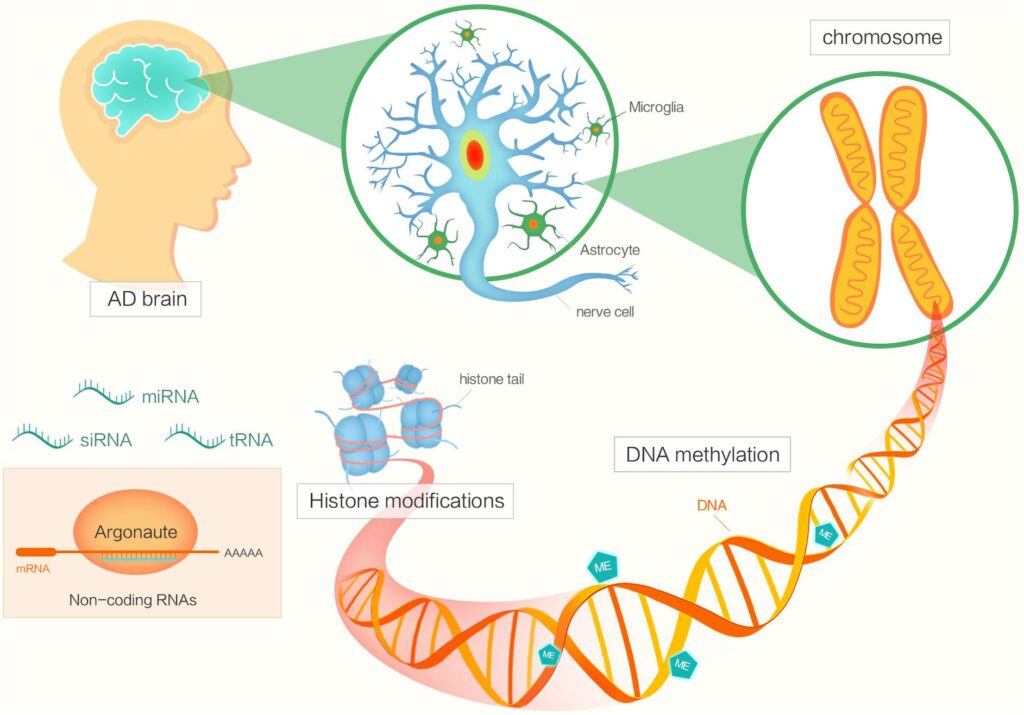Date: March 02, 2023
Author: Manish Verma
Editor: Dr. Jitendra Kumar Sinha
Epigenetics has opened a whole new realm of possibilities to decipher the internal dynamics of our brain. Research has proven that our genes are not static but may be altered and transformed by our environment, diet, and lifestyle choices. These changes can have long-term implications on human brain development, function, and behavioral patterns. Epigenetics has shed fresh light on mental health, & neurological pathologies and offered up new opportunities for creating tailored therapies. The study of epigenetics and the brain is an intriguing field that has the potential to reveal many secrets about the human brain.

Epigenetics and Brain Development:
One of the most fascinating areas of research in epigenetics is the role it plays in the development of the brain. Epigenetic modifications influence gene expression in different parts of the brain, leading to structural and functional changes that shape our cognitive abilities, emotions, and behaviors. It plays a critical role in brain development, including neurogenesis, synapse formation, and pruning. Understanding the interplay between epigenetics and brain development has significant implications for early-life interventions, personalized medicine, and the prevention and treatment of neurodevelopmental disorders. The study of epigenetics and brain development is an exciting area that holds immense promise for understanding the complexities of the human brain.

(Sourced from Guangxia et al., 2021)
Figure 2 illustrates an instance of environmental epigenetic play, demonstrating how exposure to various pesticides can lead to neurodegenerative disorders through the mechanism of epigenetic modifications. Similarly, a widely recognized illustration of epigenetic changes during brain development is the impact of maternal care on the stress response of offspring. Research studies have established that maternal care can influence epigenetic modifications in genes that regulate stress responses, ultimately affecting an individual’s reaction to stress in their later life.
Furthermore, epigenetic modifications affect brain function, impacting learning, memory, mood, and behavior through changes in genes involved in neurotransmitter function. Epigenetics has made notable contributions to our understanding of addiction, demonstrating that exposure to drugs of abuse can cause epigenetic changes in genes responsible for reward and motivation, contributing to addiction.
Therapeutic Applications of Epigenetics in Treating Brain Disorders
The current treatments available for neurodegenerative diseases, such as Alzheimer’s disease, Parkinson’s disease, amyotrophic lateral sclerosis, and Huntington’s disease, are not capable of stopping the progression of these diseases, but rather slowing the deterioration for a limited amount of time. However, genome-wide studies related to neurological disorders and neurodegenerative diseases have pointed to the role of epigenetic changes such as DNA methylation, histone modification, and noncoding RNAs in these diseases. DNA methylation machinery controls the dynamic regulation of methylation patterns in discrete brain regions, and several genes associated with neurodegenerative disorders, including depression (NR3C1, NR3C2, CRHR1, SLC6A4, BDNF, and FKBP5), Rett syndrome (MECP2), Alzheimer’s, depression (APP, BACE1, BIN1, or ANK1), and Parkinson’s disease (SNCA), have been linked to epigenetic modifications of DNA methylation and histone modification changes that affect each other.
With new epigenetic mechanisms and targets on the horizon, the modulation and regulation of epigenetic processes in the brain hold great promise for therapy. Epigenetic drugs, such as histone deacetylase inhibitors and methyl donor compounds, have shown potential in animal models of neurodegenerative diseases in alleviating cognitive symptoms and delaying or preventing the onset of motor symptoms. Thus, understanding these epigenetic changes and their interactions may lead to better treatment strategies for human neurodegenerative diseases.
Keywords:
Epigenetics, Methylation, Histone Modifications, Neurodegenerative Disorders
References:
- Ghosh, S., Sinha, J. K., & Raghunath, M. (2016). Epigenomic maintenance through dietary intervention can facilitate DNA repair process to slow down the progress of premature aging. IUBMB life, 68(9), 717–721. https://doi.org/10.1002/iub.1532
- Ghosh, S., Durgvanshi, S., Agarwal, S., Raghunath, M., & Sinha, J. K. (2020). Current Status of Drug Targets and Emerging Therapeutic Strategies in the Management of Alzheimer’s Disease. Current neuropharmacology, 18(9), 883–903. https://doi.org/10.2174/1570159X18666200429011823
- Rasmi, Y., Shokati, A., Hassan, A., Aziz, S. G., Bastani, S., Jalali, L., Moradi, F., & Alipour, S. (2022). The role of DNA methylation in progression of neurological disorders and neurodegenerative diseases as well as the prospect of using DNA methylation inhibitors as therapeutic agents for such disorders. IBRO neuroscience reports, 14, 28–37. https://doi.org/10.1016/j.ibneur.2022.12.002
- Liu, X., Jiao, B., & Shen, L. (2018). The Epigenetics of Alzheimer’s Disease: Factors and Therapeutic Implications. Frontiers in genetics, 9, 579. https://doi.org/10.3389/fgene.2018.00579
- Liu, X., Jiao, B., & Shen, L. (2018). The Epigenetics of Alzheimer’s Disease: Factors and Therapeutic Implications. Frontiers in genetics, 9, 579. https://doi.org/10.3389/fgene.2018.00579